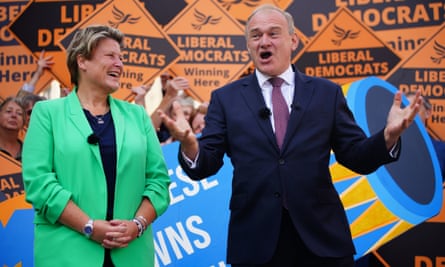One out of three ain’t bad? A surprise win in Boris Johnson’s former seat of Uxbridge gave Conservatives something to cheer on Friday morning as Rishi Sunak narrowly avoided being the first prime minister since Harold Wilson to suffer three byelection defeats on the same day. But with a local dispute swaying Uxbridge voters, the contests in Selby and Somerton may provide a clearer indication of the national mood. The picture they paint is bleak: two heavy defeats for the government to different opponents at opposite ends of England.
In the week when Labour leader Keir Starmer took to the stage for the first time with his predecessor Tony Blair, Labour achieved a byelection breakthrough in North Yorkshire worthy of Blair’s mid-1990s prime. Selby and Ainsty’s 20,000-vote Conservative majority is the largest ever overturned by Labour in a byelection, and the swing to Labour was the second largest recorded. Labour comfortably outperformed its current polling with a swing which would decimate the Conservative benches if replicated in a general election. This was the performance of an opposition on its way back into government.

The result for the Liberal Democrats in Somerton and Frome was less historic, but only because overhauling massive Conservative majorities has become business as usual for Ed Davey’s party. The Lib Dems achieved a 29-point swing to take Somerton, the fourth gain from the Conservatives on swings of 25 points or more in less than two years. A big breakthrough in the south-west will be particularly cheering – this region was a stronghold for the party for generations before the coalition wiped them out, and as the local opposition in many seats, they are well placed to gain from a broader turn against the Tories in the region.
The results in both seats also suggest the return of large-scale tactical voting, with the third-place Lib Dem vote squeezed in Selby while Labour slumped in Somerton. Tactical coordination on this scale may have delivered dozens of extra seats to opposition parties in 1997 and could be a critical factor in whether a big swing against the government at the next election turns into a Commons rout.
And so to Uxbridge. Labour had high expectations for the seat, which should have been an easy gain on current polling. Yet Uxbridge rejected Starmer, as it rejected his predecessors Harold Wilson and Tony Blair in earlier by-elections. The swing to Labour was just under seven points, which would be nowhere near enough for a majority if replicated nationally. Yet there are good reasons to think Uxbridge was an outlier, a seat where voter anger is trained on the unpopular policies of a local Labour incumbent. Campaigners reported widespread discontent at the ultra-low emission zone (Ulez) scheme being rolled out by Labour mayor Sadiq Khan in this commuter-heavy corner of west London.

However, the Conservatives’ success at mobilising Uxbridge motorists should not be treated as a broader public rejection of green policies. The prospect of Ulez will likely be more controversial than the reality, when most motorists discover they won’t need to pay. Local controversies also matter much less in a national contest, and equally potent local issues don’t exist anyway in most battleground seats. While the surprise Uxbridge win will boost Tory morale, the general election will be a referendum on Sunak, not Ulez.
Whether Brexit would endure as an electoral force once it moved from open argument to settled policy was one of the great open questions of this parliament. Just over two years ago, the Conservatives achieved the largest ever swing to an incumbent when they took heavily leave-voting Hartlepool from Labour. This, we were told, was the Brexit realignment at work, yoking together all Brexit backers in an enduring alliance with the party of Get Brexit Done. Yet while all three of the seats up last week voted heavily to leave, Brexit was barely mentioned by the Conservatives or their opponents. Leave and remain allegiances are losing their hold over voters.
As Brexit fades, older patterns are reasserting themselves. Byelection performances matching those of the mid-1990s will boost Labour hopes that they can channel a wave of anti-incumbent sentiment into government. A big, broad swing is needed if the opposition is to return to majority government in one big leap from the worst starting position in postwar history. Lib Dem resurgence in the south-west and the return of widespread tactical voting will increase Conservative worries that another 1997-style rout may be just around the corner, with even towering majorities no sure protection against an angry electorate.
Yet while Selby and Somerton provide further portents of a potential electoral earthquake, Uxbridge underlines the challenges that would follow. Labour’s current high poll ratings are driven more by hostility to the Conservatives than ardour for the opposition or its leader. Without the wave of public goodwill that buoyed up Blair after 1997, a Starmer administration will find it hard to hold voters’ loyalties through the disappointments of government. And a Labour government entering office burdened by high debts and low growth will have many disappointments to deliver.
Join the exciting world of cryptocurrency trading with ByBit! As a new trader, you can benefit from a $10 bonus and up to $1,000 in rewards when you register using our referral link. With ByBit’s user-friendly platform and advanced trading tools, you can take advantage of cryptocurrency volatility and potentially make significant profits. Don’t miss this opportunity – sign up now and start trading!







Recent Comments